April 8, 2022
Is your home a plastic-free zone? Here’s how your sustainable, plastic-free lifestyle can help address the global plastic crisis, according to Oceana
Topics: Ban Single-Use Plastics
“Every time we click check out in any online shopping platform, we contribute to the plastic crisis not only in our country but all over the world. If we don’t rethink our strategies, even if the pandemic doesn’t kill us, plastic pollution will,” warns Atty. Gloria Estenzo Ramos, Vice President of international advocacy group Oceana.
The high demand for online shopping has increased the pressure for plastic packaging amid pandemic restrictions and has resulted in a surge of plastic waste unlike any other. If this is hard to picture, imagine two dump trucks discharging plastic trash into the ocean every minute. Studies have shown that all over the world nearly 15 million metric tons of mismanaged plastic waste pollutes our ocean each year – and the Philippines remains one of the top plastic ocean polluters.
A 2020 study has earlier estimated that 710 million metric tons of plastic waste would make its way into the environment by 2040 despite efforts to curb plastic consumption. Meanwhile, a 2021 peer-reviewed study published in the Science Advances journal named Pasig the top polluting river. It also estimated the mismanaged plastic waste leaked by 466 rivers in the Philippines to be 356,371 metric tons.
While the country has been equipped with Republic Act 9003, a law that was designed to reduce and phase out harmful plastic products and packaging, this has been largely unimplemented throughout its 21 years of existence and thus, has been unable to prevent the unabated plastic pollution that now threatens the environment, health of the people and the planet.
“Some might ask why this is a problem. Maybe they’re thinking that we’ve been living with plastics all our lives and have not gotten sick, but studies have already found proof of the health risks posed by plastic, and contrary to what many believe, plastic does not go away – it does not degrade. It merely breaks up into smaller pieces called microplastics that end up in the air we breathe and the water and food we consume,” said Ramos.
Actress Andi Eigenmann, who is supporting the call for a #PlasticFreeOcean as an Oceana Wavemaker, captures it perfectly when she said of plastic pollution: “It is one of the main causes of the destruction of our environment. I can’t help but feel for my children and their children and all the other generations to come. I want to make sure that I will do my part so they can also see all the beauty and wonder that our environment – that Mother Nature has to offer most especially for our oceans.”
A mom of three and sustainable lifestyle advocate, Eigenmann urged Filipinos that “even if it’s just small things or even if we start making some changes little by little, that’s so much better than doing nothing at all, and I know that if all of us do our part and contribute, somehow these little actions of ours will collectively make a big, big change.”
According to Oceana, Filipinos can personally make a difference by opting for sustainable lifestyle choices each day. Here are some tips from the advocacy group on avoiding single-use plastic at home:
-
-
-
- Cook your own food as much as possible to avoid food deliveries in single-use plastic containers and which come with plastic cutlery.
- In case food delivery is the only option, order from restaurants which have non-plastic food packaging. For Quezon City residents, Gubat QC is a great option for yummy plastic-free food deliveries.
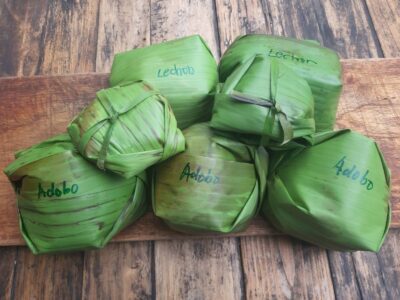
Photo © Gubat QC - Make sure to bring reusable containers when buying wet goods from the market. These can easily fit in a reusable bayong or eco-bag.
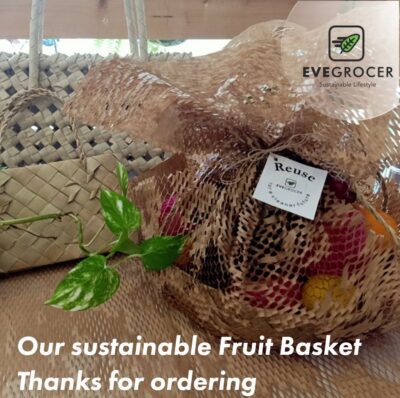
Photo © EveGrocer - Explore online supermarkets in your area and request your veggies and groceries delivered in a box and not in plastic bags. Buy products in bulk, not in sachets. A good option would be Makati City-based Humble Market for totally plastic-free deliveries.
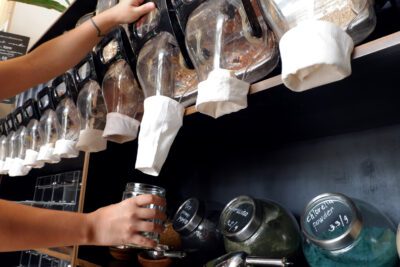
Photo © Humble Market - Never leave your house without eco-bags or canvas tote bags where you can put your planned or unplanned purchases. We adore Evegrocer’s nifty mesh rattan bags that are perfect for carrying home your veggies and fruit purchases.
- When going out, carry a reusable water bottle, bring your own coffee mug, or pack your food in a reusable lunchbox. Say no to disposable cutlery and straws by bringing your own.
- Store leftovers in glass jars. Keep your food fresh in the fridge by using beeswax wraps instead of plastic wraps. We love these beeswax wraps from The Good Cloth Co. which come in various sizes and fun prints.
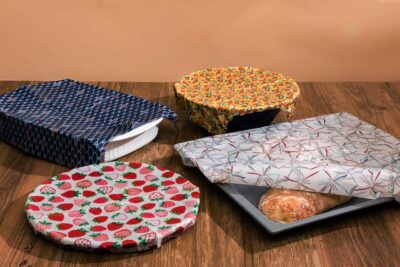
Photo © Cara Marcelo - Get your hands on plastic-free personal items such as bar soaps and shampoos, toothbrush, menstrual pads, moisturizers, make-up, etc. We’re raving about Magwai’s shampoo bars that keep hair shiny and healthy and reef-safe sunscreens while championing the zero-waste lifestyle.
- Bring your own refillable containers and buy cleaning supplies such as liquid detergents, dishwashing, and hand soaps in zero-waste refillable stores near you. Humble Market and Evegrocer both offer a lot of options to make our homes spic and span while caring for Mother Earth.
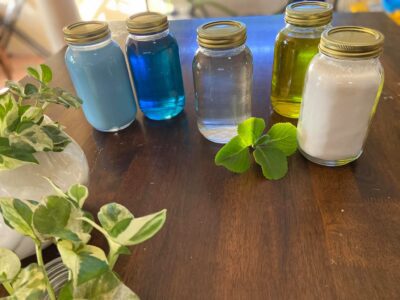
Photo © EveGrover - Use washable cloths instead of single-use wipes to clean surface areas.
-
-
Oceana continues its efforts to partner with innovative local eco-enterprises that promote alternatives to plastic products and packaging and encourage Filipino consumers to make the switch to a healthier, plastic-free lifestyle. Its eco-enterprise partners have prevented the use of single-use plastics in 25,528 transactions from June to December last year.
Oceana is an international advocacy organization dedicated to protecting the world’s oceans. Since 2014, Oceana has been working closely with national and local government agencies, civil society, fisherfolk and other stakeholders to restore abundance of Philippine fisheries and marine resources.
For More Information:
Joyce Sierra, Communications Manager, Oceana
Mobile: 09178214430 E-mail: jsierra@oceana.org
Facebook: www.facebook.com/oceana.philippines
Twitter: @oceana_ph Instagram: @oceana_ph
